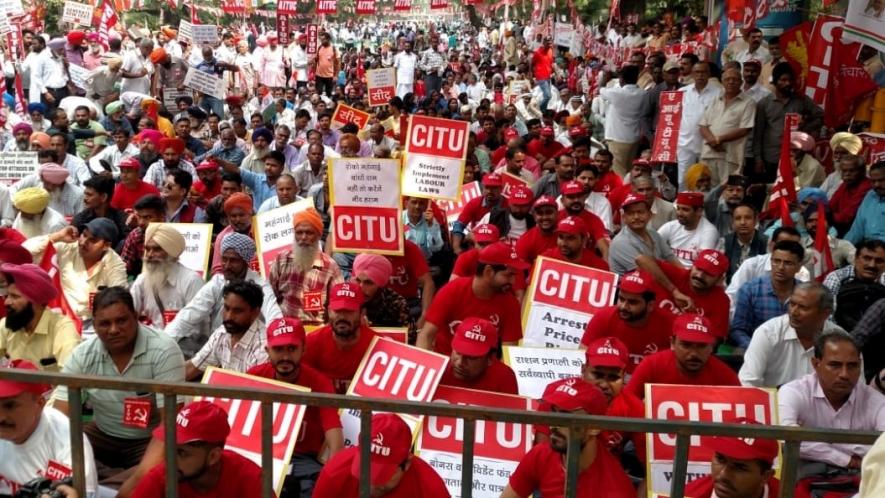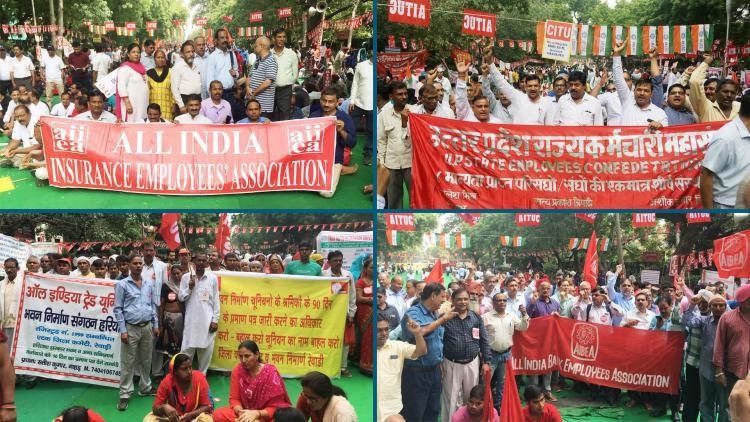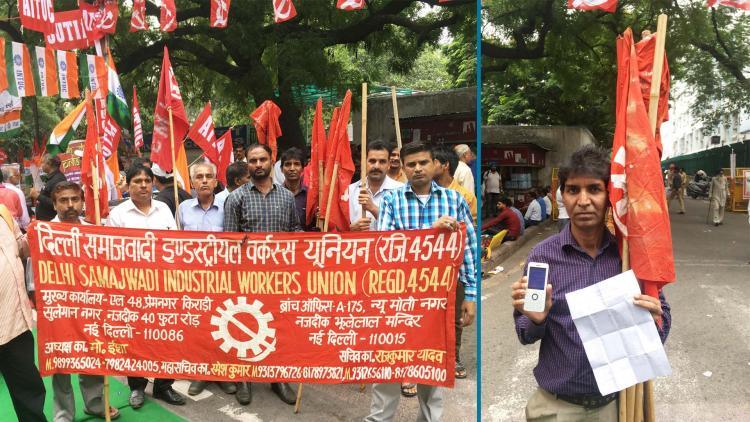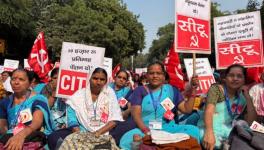Central TUs Call General Strike on Jan 8; Say Modi Govt ‘Selling Nation’

New Delhi: Workers from across sectors, such as defence, banking, coal, power, telecom among others on Monday threatened to go on a country-wide strike on January 8, 2020 at the call of 10 central trade unions.
The call was given at a convention held here by 10 central trade unions and attended by thousands of workers from across the country, to denounce the “destructive” economic policies of the Narendra Modi-led Bharatiya Janata Party government that has targeted the rights of workers and worked in favour of corporate houses.
The strike calls comes at a time when the Modi 2.0 government completed its first 100 days this month. However, ordinary citizens, especially the workers, feel there is hardly any reason to celebrate, as the country is gripped by continuing economic slowdown, job losses, and reckless privatisation of national productive assets, among other things.
Prem Pal, 52, and Ram Singh Tank, 45, both safai-karamcharis in Haryana’s Faridabad, reached Delhi early in the morning to attend the convention.

“Our demand is to end rampant contractualisation that has gripped our lives,” said Pal, who is working on contractual basis since 2001. He earns ₹18,000/month against Ram Singh, who is a permanent worker, and earns ₹40,000/month.
“We both do the same work in keeping the city clean and demand that the state pay us equally,” said Ram Singh, who was attending the convention as part of the safai-karamchari union.
Hundreds of Bharat Earth Movers Limited (BEML) employees from Bengaluru also marked their presence in the convention, voicing their protest against the proposed disinvestment of the public sector undertaking.
Domlur Srinivasa Reddy, 54, told Newsclick that the government was in the process to call expressions of interest (EOIs) from the private players this month. The Modi government gave its in-principle approval in October 2016 to the sale of 26% of public shareholding in the company.
“The move will lead to privatisation that will end the 18% and 4% job reservation for Scheduled Caste/Tribes and physically challenged people, respectively, among other things,” said Reddy.
Serving orders from Delhi, Mumbai, and Kolkata, BEML boasts of being the only public sector unit that manufactures Metro coaches in India.

In addition to this, ordnance factory workers, under the banner of All India Defence Federation Workers (AIDEF), from across the country, attended the workers’ meeting, demanding that the Modi government withdraw the proposal to corporatise the 41 ordnance factories.
“From the recently released Terms of Reference (ToR), we believe that the Modi government has already taken a decision to turn the factories into public sector entities,” said R K Prakashan, 54, who is an employee in Kanpur’s Ordnance Parachute Factory.
The convention was also attended by scores of unorganised sector workers, who form over 90% of India’s workforce and have been bearing the brunt of the ongoing economic slowdown despite their sizeable contribution to GDP. The workers voiced their protest against the dilution of labour laws by the Bharatiya Janata Party (BJP) government, adding that it was a brazen attack on the rights of workers.
Ramesh, 45, a helper in Mother Dairy’s Safal, largest retail network of fruits, vegetables and groceries in the National Capital Region, and another victim of the contractualisation practice, said he took part in the convention as he was demanding minimum wages for his work. With no weekly off, and each day’s duty extending up to 12-13 hours, he manages to earn ₹10,000/month. Incidentally, the notified minimum wage for an unskilled category worker in Delhi is ₹14,000/month.
Ramesh was a part of the Delhi Samajwadi Industrial Worker Union’s delegation. The union is active in West Delhi among small-scale industrial workers. According to Rajkumar Yadav, General Secretary of the union, the proposed increase in threshold in the Factories Act to 40 workers, will keep many workers out of the purview of labour regulations.
Anganwadi workers from Punjab and rural job guarantee scheme or MGNREGA workers from Haryana were also present in the convention in the hope of drawing some attention to the failures in the implementation of both the government schemes.
Gurdeep Kaur, 57, an anganwadi worker since 1988, says she is currently earning only ₹7,500/month. She demanded that the Integrated Child Development Services (ICDS) – a central government scheme – be converted into a department, giving lakhs of anganwadi workers in the nation the status of government employee. Suman, 35, a MGNREGA worker in Rewari had her complaints with the local authorities who, she says, cut their wages and deprive workers of numerous social benefits.
When asked who she will vote in the upcoming Assembly elections in Haryana, she replied, “first we should be able to feed our children, that’s the struggle that we are going through.”
Except the Rashtriya Swayamsevak Sangh – affiliated Bharatiya Mazdoor Sangh (BMS), the workers’ convention was attended by leaders of all central trade unions, namely, Centre of Indian Trade Unions, All India Central Council of Trade Unions, All India Trade Union Congress, Indian National Trade Union Congress, Hind Mazdoor Sabha, All India United Trade Union Centre, Trade Union Coordination Centra, Self Employed Women’s Association, Labour Progressive Front and United Trade Union Congress.
Apart for these trade unions, representatives of various independent workers’ federations from various sectors including bank, insurance, railway, electricity, road transport among others also marked their presence.
Pressing over a 12-point demand charter, the central trade unions charted a programme action for the next three months in the run-up to the January 8 general strike.
Addressing the gathering, Tapan Sen, General Secretary of CITU, called upon working people across the sectors to support the strike action, saying that, “this nation belongs to its working class and the workers won’t let Modi government sell it.”
Get the latest reports & analysis with people's perspective on Protests, movements & deep analytical videos, discussions of the current affairs in your Telegram app. Subscribe to NewsClick's Telegram channel & get Real-Time updates on stories, as they get published on our website.
























